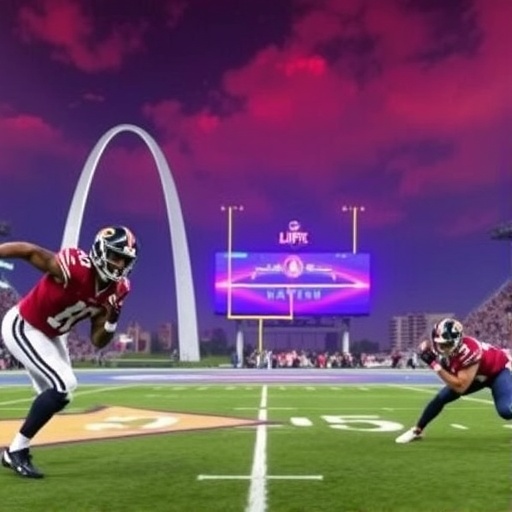NFL Expansion Rumors Heat Up: St. Louis, Portland, and London Positioned as Prime Candidates for New Franchises
In a development that has football fans buzzing across the globe, the NFL is seriously considering expansion for the first time in over two decades, with St. Louis, Portland, and London emerging as the frontrunners to host new franchises. Sources close to the league indicate that discussions at recent owners’ meetings have intensified, potentially adding two teams by the early 2030s. This move could reshape the NFL landscape, bringing the total number of teams to 34 and injecting fresh energy into markets hungry for professional football.
- St. Louis Revives NFL Hopes with Stadium Push and Fan Loyalty
- Portland’s Pacific Northwest Vision: From MLS Success to NFL Dreams
- London Calls: NFL’s International Ambition Targets Transatlantic Team
- NFL Owners Weigh Expansion Timeline Amid Economic Boom
- Future Impacts: How New Teams Could Transform NFL Landscape
The speculation gained traction after NFL Commissioner Roger Goodell hinted at expansion during a press conference at the league’s annual owners’ meeting in March 2023. “We’re always looking at ways to grow the game domestically and internationally,” Goodell stated, fueling hopes among civic leaders in candidate cities. With the NFL’s current 32-team structure thriving financially—generating over $15 billion in annual revenue—expansion represents not just growth but a strategic push into untapped territories.
St. Louis Revives NFL Hopes with Stadium Push and Fan Loyalty
St. Louis, once home to the Rams until their relocation to Los Angeles in 2016, is leading the charge to reclaim its spot in the NFL expansion race. The city’s passionate fanbase, demonstrated by sellout crowds at the Edward Jones Dome (now The Dome at America’s Center) during the Rams’ tenure, remains a key selling point. Local officials estimate that an NFL team could generate up to $200 million in annual economic impact, including tourism and job creation.
Recent efforts have centered on a proposed $1.2 billion stadium project near the Mississippi River, backed by a public-private partnership. St. Louis Mayor Tishaura Jones has been vocal about the city’s readiness. “St. Louis loves football, and we’re prepared to build a state-of-the-art venue that meets NFL standards,” Jones said in an interview with local media. The proposal includes modern amenities like retractable roofs and sustainable features, addressing past criticisms that led to the Rams’ departure.
Historical context adds emotional weight to St. Louis’s bid. The city hosted the Cardinals from 1960 to 1987 before the Rams arrived in 1995, winning Super Bowl XXXIV in 2000. Fan groups like the St. Louis Sports Alliance have launched petitions garnering over 50,000 signatures, emphasizing the void left by the Rams. Economists point to comparable markets like Nashville, where the Titans contribute $300 million yearly to the local economy, as a blueprint for success.
Challenges persist, however. The NFL’s relocation guidelines, updated in 2021, require 20 of 32 owners’ approval for expansion, and some worry about market saturation in the Midwest. Yet, St. Louis’s central location and access to a 2.8 million-person metropolitan area position it strongly. Analysts from Sports Business Journal predict that if expansion happens, St. Louis has a 40% chance of landing a team, bolstered by its history and infrastructure investments.
Portland’s Pacific Northwest Vision: From MLS Success to NFL Dreams
On the West Coast, Portland is making a compelling case for NFL expansion by leveraging its vibrant sports culture and growing population. Known for the Portland Trail Blazers in the NBA and the Timbers in Major League Soccer, the city boasts a proven track record of supporting professional teams. The Timbers’ 2015 MLS Cup victory drew record crowds, signaling a fanbase eager for more big-league action.
Portland’s bid hinges on a ambitious $2 billion stadium plan in the Lloyd District, which could serve multiple sports. Oregon Governor Tina Kotek has expressed support, noting in a recent statement that “an NFL franchise would elevate Portland’s status as a sports destination and drive economic development.” The project envisions a 65,000-seat venue with public transit integration, addressing traffic concerns in the eco-conscious city.
Demographics play a crucial role here. Portland’s metro area of 2.5 million is expanding rapidly, with a median age of 39—ideal for NFL viewership. A 2022 feasibility study by HKS Architects estimated that an NFL team could add $250 million to the local GDP annually, including sponsorships and media rights. The city’s tech-savvy population, home to companies like Nike, offers lucrative corporate partnerships, potentially rivaling Seattle’s Seahawks model just 170 miles north.
However, competition with Seattle poses a hurdle. NFL owners are cautious about dividing the Pacific Northwest market, which generates $1.5 billion in combined revenue for the Seahawks and their affiliates. Portland proponents counter that the region’s 7 million potential fans could support two teams, citing the NBA’s successful coexistence of the Blazers and SuperSonics (pre-relocation). Local business leaders, including Timbers owner Merritt Paulson, have pledged $500 million in private funding, sweetening the deal.
Experts like Bill Sutton, a sports management professor at Carnegie Mellon University, highlight Portland’s unique appeal. “The city’s progressive vibe and outdoor lifestyle could attract a modern NFL franchise focused on community engagement,” Sutton told ESPN. With MLS success as a foundation, Portland’s NFL expansion aspirations feel within reach, potentially debuting a team by 2032.
London Calls: NFL’s International Ambition Targets Transatlantic Team
Across the Atlantic, London is positioning itself as the NFL’s boldest expansion bet, aiming to establish a full-time franchise in Europe for the first time. The league has hosted annual International Series games at Wembley Stadium since 2007, drawing over 80,000 fans per match and proving football’s (or soccer’s) home can embrace American football. In 2023 alone, three games attracted 190,000 attendees, underscoring London’s market potential.
The proposal involves a 60,000-seat stadium in East London, possibly redeveloping the Olympic Stadium, with an estimated cost of £1.5 billion ($1.9 billion). UK Culture Secretary Lucy Frazer has backed the idea, stating, “Bringing an NFL team to London would strengthen our cultural ties with the US and boost tourism.” The British government could subsidize up to 20% of the project, viewing it as a post-Brexit economic driver.
Global reach is the NFL’s primary motivation. With international revenue at $1 billion yearly—up 15% from 2022— a London team could tap into Europe’s 750 million population. NFL executive VP of international Mark Waller emphasized this in a 2023 panel: “London isn’t just a test market; it’s a gateway to worldwide growth.” Fan engagement is strong, with over 20 million UK viewers tuning into NFL broadcasts annually via Sky Sports.
Logistics present significant challenges. Time zone differences (five to eight hours ahead of US East Coast) could disrupt scheduling, and travel demands on players might strain the CBA. Critics, including NFL Players Association president JC Tretter, warn of fatigue risks, but proponents argue hybrid schedules and international bye weeks could mitigate issues. Financially, a London franchise might command a $4 billion expansion fee, split among owners, making it lucrative.
Precedents like the NBA’s Toronto Raptors and MLB’s Toronto Blue Jays show international success is possible. A 2023 Deloitte report projects a London NFL team could generate £300 million in annual revenue, including merchandise and broadcasting deals with BBC and DAZN. As the NFL eyes 35-36 teams long-term, London’s bid represents a pioneering step toward true global expansion.
NFL Owners Weigh Expansion Timeline Amid Economic Boom
Behind closed doors, NFL owners are deliberating the expansion timeline, with a decision potentially slated for the 2025 league meetings. Commissioner Goodell has outlined criteria including market size, stadium viability, and financial commitment. “Expansion must enhance the league without diluting talent,” he noted, referencing the 2002 addition of the Houston Texans as a model that maintained competitive balance.
Financial incentives are immense. Each existing owner could receive $500 million from expansion fees, per league estimates, amid record TV deals worth $110 billion through 2033. Quotes from key figures vary: Dallas Cowboys owner Jerry Jones supports growth, saying, “More teams mean more revenue for everyone,” while New England Patriots owner Robert Kraft urges caution on international risks.
Statistics underscore the league’s health: average attendance hit 67,000 per game in 2023, and digital viewership surged 20%. Analysts from Nielsen predict expansion could add $2-3 billion in annual league revenue by 2035. Cities like St. Louis, Portland, and London are submitting formal bids by mid-2024, with site visits expected soon.
Fan reactions are electric. Social media trends like #NFLtoSTL have amassed millions of impressions, while Portland’s “Gridiron Gateway” campaign raises awareness. In London, petitions for a team exceed 100,000 signatures. As bids evolve, the NFL’s expansion committee, chaired by Miami Dolphins owner Stephen Ross, will scrutinize proposals for sustainability.
Potential hurdles include antitrust scrutiny from the DOJ, given the league’s monopoly status, and ensuring equitable talent distribution via the draft. Yet, with the NFL’s market cap exceeding $100 billion, the momentum for expansion is undeniable.
Future Impacts: How New Teams Could Transform NFL Landscape
Looking ahead, NFL expansion to St. Louis, Portland, and London could herald a new era of inclusivity and innovation. Domestically, St. Louis’s return might reignite Midwest rivalries, boosting attendance in nearby markets like Chicago and Minneapolis. Portland could foster a West Coast division realignment, challenging the dominance of established teams like the Rams and 49ers.
Internationally, a London franchise would accelerate the NFL’s global strategy, potentially leading to games in Mexico City and Germany. This could diversify revenue streams, with projections of 10% growth in international merchandise sales. Economically, host cities stand to gain immensely: St. Louis might see 5,000 new jobs, Portland could revitalize urban districts, and London might attract $500 million in US tourism yearly.
For fans, the excitement is palpable. Enhanced rivalries, shorter travel for West Coast games, and transatlantic matchups promise thrilling narratives. The league plans to maintain roster parity through expanded drafts and salary cap adjustments. As Goodell envisions, “Expansion isn’t just about numbers; it’s about growing the passion for football worldwide.”
Next steps include bid evaluations in 2024, with announcements possibly by 2026. Stakeholders in St. Louis, Portland, and London are optimistic, preparing for what could be the most transformative period in NFL history since its merger in 1970. The game is evolving, and these cities are ready to play ball.










